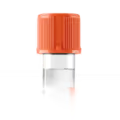Do I need a Thyroid antibodies test?
Feeling unexplained fatigue, weight changes, brain fog, or temperature sensitivity that won't go away? Could your immune system be attacking your thyroid, and could testing for thyroid antibodies reveal what's happening?
Thyroid antibodies indicate whether your immune system is mistakenly targeting your thyroid gland, which can disrupt hormone production and trigger symptoms like exhaustion, weight fluctuations, and mood changes. Elevated levels often point to autoimmune conditions like Hashimoto's or Graves' disease.
**Testing your thyroid antibodies** gives you a vital snapshot of your immune activity and thyroid health, empowering you to personalize your treatment plan, adjust your lifestyle, and address the root cause of your symptoms. **Get tested** to take control and start feeling better.
Method: FDA-cleared clinical laboratory assay performed in CLIA-certified, CAP-accredited laboratories. Used to aid clinician-directed evaluation and monitoring. Not a stand-alone diagnosis.

A derived biomarker is a value that is calculated from other directly measured biomarkers rather than being measured directly in the lab.
Get tested with Superpower
**If you’ve been postponing blood testing for years or feel frustrated by doctor appointments and limited lab panels, you are not alone.** Standard healthcare is often reactive, focusing on testing only after symptoms appear or leaving patients in the dark.
Superpower flips that approach. We give you full insight into your body with over **100 biomarkers**, personalized action plans, long-term tracking, and answers to your questions, so you can stay ahead of any health issues.
With physician-reviewed results, CLIA-certified labs, and the option for at-home blood draws, Superpower is designed for people who want clarity, convenience, and real accountability - all in one place.
Key benefits of Thyroid antibodies testing
- Detects autoimmune thyroid disease before symptoms appear or hormone levels shift.
- Explains unexplained fatigue, weight changes, or mood swings linked to thyroid inflammation.
- Identifies Hashimoto's thyroiditis, the most common cause of underactive thyroid.
- Flags Graves' disease, which drives overactive thyroid and metabolic stress.
- Guides treatment decisions when thyroid hormone levels are borderline or fluctuating.
- Protects fertility by uncovering antibodies that may impair conception or pregnancy.
- Tracks disease activity over time to adjust therapy and prevent complications.
- Best interpreted with TSH and thyroid hormone levels for complete thyroid assessment.
What is Thyroid antibodies?
Thyroid antibodies are immune proteins (immunoglobulins) produced by your body's defense system that mistakenly target components of your own thyroid gland. The most common types are thyroid peroxidase antibodies (TPO antibodies) and thyroglobulin antibodies (TG antibodies). These antibodies arise when the immune system incorrectly identifies thyroid tissue or thyroid-related proteins as foreign invaders.
When your immune system turns on your thyroid
The presence of thyroid antibodies signals autoimmune thyroid disease, where ongoing immune activity can damage thyroid cells and disrupt hormone production. TPO antibodies attack an enzyme essential for making thyroid hormones, while TG antibodies target the protein scaffold used to build those hormones.
A marker of immune confusion, not infection
Unlike antibodies that fight bacteria or viruses, thyroid antibodies reflect a misdirected immune response against self. They are the hallmark of conditions like Hashimoto's thyroiditis and Graves' disease. Detecting these antibodies helps identify the autoimmune nature of thyroid dysfunction, distinguishing it from other causes of thyroid imbalance.
Why is Thyroid antibodies important?
Thyroid antibodies reveal whether your immune system is mistakenly attacking your thyroid gland, the metabolic control center that governs energy production, temperature regulation, heart rate, and brain function. Their presence signals autoimmune thyroid disease, the most common cause of thyroid dysfunction worldwide, affecting metabolism, fertility, mood, and cardiovascular health across decades.
When antibodies stay absent or minimal
In healthy individuals, thyroid antibodies are undetectable or present at very low levels, reflecting immune tolerance. This absence protects the thyroid from inflammatory damage. Women planning pregnancy benefit especially from negative antibody status, as elevated antibodies increase miscarriage risk and postpartum thyroiditis even when thyroid hormone levels appear normal.
What rising antibodies signal systemically
Elevated thyroid peroxidase (TPO) or thyroglobulin antibodies indicate active autoimmune attack, most commonly Hashimoto's thyroiditis, which gradually destroys thyroid tissue and leads to hypothyroidism. Symptoms emerge slowly: fatigue, weight gain, cold intolerance, brain fog, constipation, and depression. TSH receptor antibodies, seen in Graves' disease, overstimulate the gland, causing hyperthyroidism with anxiety, palpitations, heat intolerance, and weight loss. Women face autoimmune thyroid disease five to eight times more often than men, with peaks during reproductive years and perimenopause.
The long view on immune-thyroid crosstalk
Thyroid antibodies predict future thyroid failure years before hormone abnormalities appear, allowing early monitoring. They also cluster with other autoimmune conditions like type 1 diabetes and celiac disease. Tracking antibody trends helps assess disease activity, guide surveillance intervals, and protect metabolic and reproductive health over the lifespan.
What do my Thyroid antibodies results mean?
Low or undetectable thyroid antibodies
Low values usually reflect the absence of autoimmune activity against the thyroid gland. This means your immune system is not producing antibodies that target thyroid tissue or thyroid-related proteins. Most healthy individuals have undetectable or very low levels of thyroid peroxidase antibodies and thyroglobulin antibodies, which supports normal thyroid function and gland integrity over time.
Optimal thyroid antibody levels
Being in range suggests no active autoimmune thyroid disease. For thyroid antibodies, optimal is typically at the low end or undetectable, as any elevation may signal immune activation even before thyroid hormone levels change. Stable low levels support long-term thyroid health and reduce risk of progression to overt autoimmune thyroid conditions.
Elevated thyroid antibodies
High values usually reflect autoimmune thyroid disease, most commonly Hashimoto thyroiditis or Graves disease depending on the antibody type. Elevated thyroid peroxidase or thyroglobulin antibodies indicate immune attack on thyroid tissue, which can gradually impair hormone production and lead to hypothyroidism. Thyroid receptor antibodies, when elevated, often drive hyperthyroidism by overstimulating the gland. Women are more frequently affected than men, and antibody levels may fluctuate with pregnancy or postpartum periods.
Factors that influence thyroid antibody interpretation
Antibody levels can vary with assay methods and may rise or fall over time independent of symptoms. Pregnancy often suppresses antibodies temporarily, while the postpartum period may trigger flares. Isolated antibody elevation without thyroid dysfunction warrants monitoring but does not always progress to disease.

.svg)









.avif)
.avif)


